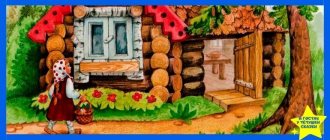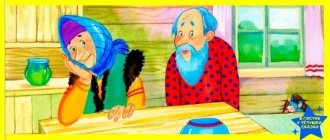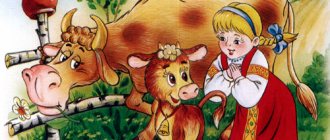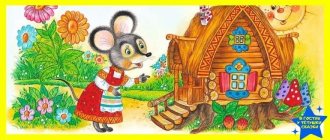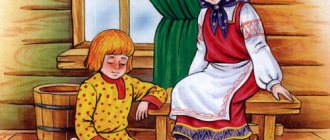Analysis of the fairy tale Chicken Ryaba
The child's life experience makes the fairy tale attractive to him. All the actions that the characters perform are clear to him: “egg”, “beat but didn’t break”, “the mouse broke”, “crying”, “the chicken calms down”. This is a chain of emotions understandable to a little man, which he expresses when he listens to a fairy tale: interest, grief, compassion, reassurance. This is the secret of the popularity of the fairy tale among the little ones. For adult uncles and aunts, a short, simple children's fairy tale with traditional heroes - a grandfather and a woman - is easy to retell, but it is not easy to explain the behavior of the characters. If the egg is golden, why break it? If an egg breaks, why cry? Yes, the meaning of the fairy tale Ryaba Hen is not easy to explain: happiness in the form of a golden egg left Grandfather and Baba because they were unable to keep it; but perhaps a simple (egg) human happiness will be enough for an ordinary person, which he will learn to appreciate.
Fairy tale No. 70 from the collection “Russian Folk Tales” by A. N. Afanasyev
Once
upon a time there was an old man and an old woman, they had a Tatar hen, she laid an egg in the closet [1] under the window: colorful, colorful, boney, tricky! I put it on the shelf; The mouse walked, shook its tail, the shelf fell, and the egg broke.
The old man is crying, the old woman is sobbing, the stove is on fire, the top of the hut is shaking, the girl-granddaughter hanged herself out of grief. Mallow[2] comes and asks: Why are they crying so much?
The old men began to retell:
- How can we not cry? We have a Tatar hen, she laid an egg in the hut under the window: motley, vostro, boney, tricky! I put it on the shelf; The mouse walked, shook its tail, the shelf fell, and the egg broke! I, an old man, am crying, the old woman is sobbing, the stove is on fire, the top of the hut is shaking, the girl-granddaughter hanged herself out of grief.
As soon as the breadmaker heard it, she broke all the bread and threw it away. The sexton comes up and asks the breadmaker: why did she throw away the bread?
She told him all the grief; the sexton ran to the bell tower and broke all the bells.
The priest comes and asks the sexton: why did you break the bells?
The sexton recounted all the grief to the priest, and the priest ran and tore up all the books.
Folk creativity
The grandfather and woman were alive and there was a hen in them. She brought an egg, and it was not just gold, but gold. Did beat, beat without breaking. The woman beat and beat, but did not break. The bear ran across the bridge, hit with its tail, the egg fell and broke. Grandfather is crying, woman is crying, the chicken is clucking, the gate is creaking.
A magpie flew in, sat on the gate and fed:
- Why are you creaking like that?
- Oh, if you knew, magpie, you would have torn your own tail off!
- Yak yes yak?
- As if the grandfather and woman were alive, there was a pockmarked hen in them. She brought an egg, and it was not just gold, but gold. Did beat, beat without breaking. The woman beat and beat, but did not break.
The bear ran across the bridge, hit with its tail, the egg fell and broke. Grandfather is crying, woman is crying, the chicken is going crazy, the gate is creaking, the magpie has taken and torn off its tail.
A magpie flew into the forest, landed on an oak tree, and the tree feeds:
- Soroko, why did you pull your tail out?
- Oh, if you knew it, you would have broken yourself.
- Yak yes yak?
- As if the grandfather and woman were alive, there was a pockmarked hen in them. She brought an egg, and it was not just gold, but gold. Did beat, beat without breaking. The woman beat and beat, but did not break. The bear ran across the bridge, hit with its tail, the egg fell and broke. Grandfather is crying, woman is crying, the chicken is going crazy, the gate is creaking, the magpie has taken and torn off its tail.
Taking the oak tree on itself, it broke off. The sheep and rams come to graze. From and nourish oak:
- Duba, duba, what if you screwed yourself up?
- Oh, if you, sheep, knew, you would break your own horns.
- Yak yes yak?
- As if the grandfather and woman were alive, there was a pockmarked hen in them. She brought an egg, and it was not just gold, but gold. Did beat, beat - without breaking. The woman beat and beat, but did not break. The bear ran across the bridge, hit with its tail, the egg fell and broke. Grandfather is crying, woman is crying, the hen is in a hurry, the gate is creaking, the magpie took its tail and tore off the oak tree on its back.
Here the rams broke their horns. They went to the water to drink, and the water nourishes:
- Sheep, did you break your horns?
- Oh, if you, river, I knew, you would have dissolved the water in yourself.
- Yak yes yak?
- As if the grandfather and woman were alive, there was a pockmarked hen in them. She brought an egg, and it was not just gold, but gold. Did beat, beat - without breaking. The woman beat and beat, but did not break.
The bear ran across the bridge, hit with its tail, the egg fell and broke. Grandfather is crying, woman is crying, the hen is in a mess, the gate is creaking, the magpie has taken its tail and torn it off, the oak tree has broken on itself, and the ram’s horns have been broken.
Then the river took and poured water. Mother comes for water, pours water - there is no water.
- What is it? Where is the water?
“If you knew it, mother, you would have torn your underwear.”
- Yak yes yak?
- As if the grandfather and woman were alive, there was a pockmarked hen in them. She brought an egg, and it was not just gold, but gold. Did beat, beat - without breaking. The woman beat and beat, but did not break. The bear ran across the bridge, hit with its tail, the egg fell and broke. The grandfather is crying, the woman is crying, the chicken is in a mess, the gates are creaking, the magpie took its tail and tore it off, the oak tree broke, the ram's horns were broken, and the river spilled water.
Then mother tore her sleeping bag. When you come home, your father greets you.
- Mother, what’s with the empty buckets?
- Oh, what if you, father, if you knew, you would tear your beard.
- Yak yes yak?
- As if the grandfather and woman were alive, there was a pockmarked hen in them. She brought an egg, and it was not just gold, but gold. Did beat, beat - without breaking. The woman beat and beat, but did not break. The bear ran across the bridge, hit with its tail, the egg fell and broke. Grandfather is crying, woman is crying, the chicken is in a mess, the gate is creaking, the magpie took its tail and tore it off, the oak tree broke, the ram's horns were broken, the river spilled water, and the mother tore the spade.
Father took and tore his beard and said:
- From now on I won’t rule the service!
Ukrainian folk tales. Recording, arranging and literary reviewing Mykola Zinchuk. © Published with the permission of the legal authorities.
176 (4027). Ryabka hen. SUS 2022. Recorded by Mykola Zinchuk on June 29, 2007. Samoilenko Nadiya Petrivna (1950). Chernihiv region, Nosiv district, Ploske
Finnish taxonomy
As mentioned above, the plot of this tale is found among many nations, and sometimes it is so disguised by national characteristics that special research is required to get to the essence of the tale and correctly classify it according to the plot. At the same time, the matter is complicated by the fact that there are now several main classifications of fairy tale plots and it is necessary to turn to comparative indexes of plots, of which there are also several, and they also differ from each other. In a word, the situation in fairy-tale folklore now is the same as it was in biology before Linnaeus’ “System of Nature” or in chemistry before Mendeleev’s Periodic Table of Elements.
For example, in the “Index of fairy-tale plots according to the Aarne system” by N.P. Andreev, plot 241 III (2022) “The hen laid a golden egg: the mouse broke it, the old woman was crying, the old man was crying behind her, the sexton was behind him, etc., etc. d." is found in Section I, “Tales of Animals” (plots 1–299), subsection “Birds and Fishes” (plots 220–274). And, for example, in the latest edition of Stith Thompson’s Motif-index of folk-literature, this plot numbered B103.2.1 (Bird lays money or golden eggs or an egg) is in the group B100-B119. Treasure animals ("Treasures of animals") subsections B100-B199. Magic animals (“Magical animals”) section B. Animals (“Animals”). And these are just two “determinants” of fairy tale plots - ours and the American one.
With such national “pluralism” in taxonomy, biology, for example, simply would not exist as a science. Carl Linnaeus in the 17th century brought order to it and put everything into shelves, where even a schoolchild could easily find what he needed; in chemistry, Dmitry Mendeleev did the same in the 19th century. The first to try to restore order in folklore was Antti Aarne, a professor at the Imperial Alexander University (now the University of Helsinki). His first “Index of Fairy Tale Types” was published in German in 1910, then it was reprinted several times, supplemented and continues to be supplemented and corrected to this day in the form of the “Index of Folk Tale Plots” (ATU Index - Aarne-Thomson-Uther Index). But such comparative indexes are quite difficult to use even for specialists.
The reason for this discrepancy was pointed out by Leningrad University professor Vladimir Propp back in the 1920s: “While the physical and mathematical sciences have a coherent classification, a uniform terminology adopted by special congresses, a methodology that was improved by continuity from teachers to students, we have all this no... It is also completely obvious and does not require any proof that the origin of any phenomenon can be discussed only after the phenomenon has been described. Meanwhile, the study of the fairy tale was carried out mainly only genetically, for the most part without attempts at a preliminary systematic description... It is clear that before illuminating the question of where the fairy tale comes from, it is necessary to answer the question of what it is... Although classification forms the basis of any study, itself it must be the result of a certain preliminary elaboration. Meanwhile, we see just the opposite: most researchers begin with classification, introducing it into the material from the outside, and not deducing it from the material essentially... Classifiers, moreover, often violate the simplest rules of division. Here we find one of the reasons for the deadlock...”
In short, Professor Propp reproached his colleagues for missing a whole stage in the evolution of any science - the descriptive one; they stubbornly do not admit it and continue to put things that they themselves do not fully understand, or at least have not fully researched, into the shelves they have invented. Professor Propp spoke bitter words, but he had the right to do so: in the 1920s, especially in the second half, fairy tale folkloristics flourished in our country. Within the framework of the State (formerly Imperial) Russian Geographical Society, the “Fairytale Commission”, chaired by Academician Oldenburg, resumed its work.
Just think: in 1929, the year of the “Great Turning Point” according to Stalin’s definition, when the gallant march of aviators “We were born to make a fairy tale come true” sounded throughout the country, Soviet folklorists and storytellers held a symposium discussing the Verzeichnis der Mrchentypen of the “White Finn” Aarne . The upper echelon of Soviet power at all times treated fairy tales favorably and created no less comfortable working conditions for fairy tale scientists than for scientists working for defense. Suffice it to say that the complete academic edition of fairy tales was blessed by the Chairman of the Council of People's Commissars (government) Vyacheslav Molotov.
Notes
- A corner in a hut, a counter, a stall in which chickens were kept in winter.
- A woman at the church who baked prosvira - specially shaped bread
- Recorded in Arkhangelsk province. A. Kharitonov.
- A tub hollowed out of a solid tree or stump.
- Beggar, cripple.
- Veres are pillars on which gates are hung.
- They made a face
- Chicken - fairy tale No. 70 from the collection “Russian Folk Tales” by A. N. Afanasyev
- Chicken - fairy tale No. 71 from the collection “Russian Folk Tales” by A. N. Afanasyev
- Dear egg. Saratov region
- Ruffed chicken. Voronezh region
- There was an old man and an old woman. Vologda region
- Chicken Ryaba. Ukrainian story. Chernigov region
- Ryabonka Chicken. Ukrainian story. Chernigov region
- Did and Baba. Ukrainian story. Poltava region
- About the pockmarked chicken. Ukrainian story. Kharkov region.
- Belarusian story.
- Golden egg. Retelling by D. Ushinsky
- Ryabka hen. Retelling of A. Tolstoy
from the collection “Russian Folk Tales” by A. N. Afanasyev
TO
Just like our grandmother had a hazel hen in her backyard; The chicken planted an egg, from shelf to shelf, into an aspen hollow [4], into a cubby under the bench. The mouse ran, returned with its tail, and broke the testicle! About this testicle the system[5] began to cry, Baba began to sob, the faithful[6] began to laugh, Chickens began to fly, gates creaked; The rubbish under the threshold began to smoke, the doors began to shake [7], the wall crumbled; The priest’s daughters came with water, They broke the tub, They said to the priest: “You don’t know anything, mother! After all, in my grandmother’s backyard there was a hazel hen; The chicken planted an egg, from shelf to shelf, into an aspen hollow, into a cubby under the bench. The mouse ran, returned with its tail, and broke the testicle! The system began to cry about this testicle, Baba began to sob, and burst out laughing. Chickens are flying, the gates are creaking, the rubbish under the threshold is lighting up, the doors are shaking, the wall is crumbling; We walked with water and broke the tub!” The priest kneaded the kneading mixture - She scattered all the dough on the floor; I went to church, the priest said: “You don’t know anything... After all, in my grandmother’s backyard (The same story is repeated again.) ……… the tyn crumbled; Our daughters walked with water - The tub was broken, they told me; I kneaded the dough - I scattered all the dough!” The priest began to tear the book - he scattered it all over the floor!
